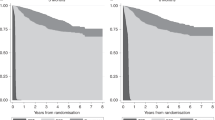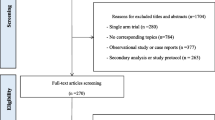Abstract
Purpose
The purpose of this study was to compare health-related quality of life (HRQoL) and costs associated with 2 adjuvant chemotherapy regimens [capecitabine-based therapy versus 5-fluorouracil/leucovorin (5-FU/LV)-based therapy] in stage III colorectal cancer patients.
Methods
We conducted a prospective, open-label, observational, multicenter study from July 2008 to July 2011. The European Organization for Research and Treatment of Cancer QLQ-C30 and QLQ-CR38 questionnaires was used to assess HRQoL before, during, and after treatment. The direct and indirect costs of adjuvant treatment were estimated from a specially prepared questionnaire, the National Health Insurance Research Database, and other published sources. We used propensity scoring to match samples between groups and performed multivariate analyses to adjust for differences in patient demographics and clinical characteristics.
Results
A total of 497 patients were enrolled, and 356 completed the surveys. Following propensity score matching, 239 patients were included in the analysis (122 in the capecitabine-based group, 117 in the 5-FU/LV-based group). Global HRQoL scores did not differ significantly between the two groups. However, compared to patients in the 5-FU/LV-based group, patients in the capecitabine-based group had less nausea and vomiting (mid-term, P = 0.024; final, P = 0.013), appetite loss (mid-term, P < 0.0001; final, P = 0.001), and fewer side effects from chemotherapy (mid-term, P = 0.017). In addition, the monthly cost of capecitabine-based therapy was lower than those of 5-FU/LV-based therapy [NT$31,895.46 (US$1063.18) vs. NT$79,159.24 (US$2638.64) per patient].
Conclusions
Capecitabine is a reasonable alternative and cost-effective treatment option under current conditions for patients with stage III colorectal cancer.


Similar content being viewed by others
References
Jemal, A., Murray, T., Samuels, A., Ghafoor, A., Ward, E., & Thun, M. J. (2003). Cancer statistics, 2003. CA-A Cancer Journal for Clinicians, 53(1), 5–26.
Parkin, D. M. (2001). Global cancer statistics in the year 2000. Lancet Oncology, 2(9), 533–543.
Health Promotion Administration, Ministry of Health and Welfare, Taiwan. (2013). Cancer Registry Annual Report, 2010.
Health Promotion Administration, Ministry of Health and Welfare, Taiwan. (2010). Cancer Registry Annual Report, 2008.
National Health Insurance Administration, Ministry of Health and Welfare, Taiwan. (2012). Statistical annual report of medical care, 2011.
Obrand, D. I., & Gordon, P. H. (1997). Incidence and patterns of recurrence following curative resection for colorectal carcinoma. Diseases of the Colon and Rectum, 40(1), 15–24.
Midgley, R., & Kerr, D. J. (2005). Adjuvant chemotherapy for stage II colorectal cancer: the time is right! Nature Clinical Practice Oncology, 2(7), 364–369.
Van Cutsem, E., Dicato, M., Wils, J., Cunningham, D., Diaz-Rubio, E., Glimelius, B., et al. (2002). Adjuvant treatment of colorectal cancer (current expert opinion derived from the Third International Conference: Perspectives in Colorectal Cancer, Dublin, 2001). European Journal of Cancer, 38(11), 1429–1436.
Labianca, R., Marsoni, S., Pancera, G., Torri, V., Zaniboni, A., Erlichman, C., et al. (1995). Efficacy of adjuvant fluorouracil and folinic acid in colon-cancer. Lancet, 345(8955), 939–944.
OConnell, M. J., Mailliard, J. A., Kahn, M. J., MacDonald, J. S., Haller, D. G., Mayer, R. J., et al. (1997). Controlled trial of fluorouracil and low-dose leucovorin given for 6 months as postoperative adjuvant therapy for colon cancer. Journal of Clinical Oncology, 15(1), 246–250.
Wolmark, N., Rockette, H., Mamounas, E., Jones, J., Wieand, S., Wickerham, D. L., et al. (1999). Clinical trial to assess the relative efficacy of fluorouracil and leucovorin, fluorouracil and levamisole, and fluorouracil, leucovorin, and levamisole in patients with Dukes’ B and C carcinoma of the colon: Results from national surgical adjuvant breast and bowel project C-04. Journal of Clinical Oncology, 17(11), 3553–3559.
Arkenau, H. T., Bermann, A., Rettig, K., Strohmeyer, G., Porschen, R., & Arbeitsgemeinschaft Gastrointestinale Onkologie. (2003). 5-Fluorouracil plus leucovorin is an effective adjuvant chemotherapy in curatively resected stage III colon cancer: long-term follow-up results of the adjCCA-01 trial. Annals of Oncology, 14(3), 395–399.
Liu, G., Franssen, E., Fitch, M. I., & Warner, E. (1997). Patient preferences for oral versus intravenous palliative chemotherapy. Journal of Clinical Oncology, 15(1), 110–115.
Pfeiffer, P., Mortensen, J. P., Bjerregaard, B., Eckhoff, L., Schonnemann, K., Sandberg, E., et al. (2006). Patient preference for oral or intravenous chemotherapy: A randomised cross-over trial comparing capecitabine and Nordic fluorouracil/leucovorin in patients with colorectal cancer. European Journal of Cancer, 42(16), 2738–2743.
Twelves, C., Gollins, S., Grieve, R., & Samuel, L. (2006). A randomised cross-over trial comparing patient preference for oral capecitabine and 5-fluorouracil/leucovorin regimens in patients with advanced colorectal cancer. Annals of Oncology, 17(2), 239–245.
Guyatt, G. H., Ferrans, C. E., Halyard, M. Y., Revicki, D. A., Symonds, T. L., Varricchio, C. G., et al. (2007). Exploration of the value of health-related quality-of-life information from clinical research and into clinical practice. Mayo Clinic Proceedings, 82(10), 1229–1239.
Segalla, J. G. M., Van Eyll, B., Federico, M. H. H., Skare, N. G., Franke, F. A., Perdicaris, M. R., et al. (2008). Evaluation of quality of life in patients with metastatic colorectal cancer treated with capecitabine. Clinical Colorectal Cancer, 7(2), 126–133.
Ward, S. E., Kaltenthaler, E., Cowan, J., Marples, M., Orr, B., & Seymour, M. T. (2006). The clinical and economic benefits of capecitabine and tegafur with uracil in metastatic colorectal cancer. British Journal of Cancer, 95(1), 27–34.
Hsu, T. C., Chen, H. H., Yang, M. C., Wang, H. M., Chuang, J. H., Jao, S. W., et al. (2011). Pharmacoeconomic analysis of capecitabine versus 5-fluorouracil/leucovorin as adjuvant therapy for stage III colon cancer in Taiwan. Value in Health, 14(5), 647–651.
Aaronson, N. K., Ahmedzai, S., Bergman, B., Bullinger, M., Cull, A., Duez, N., et al. (1993). The European-Organization-for-Research-and-Treatment-of-Cancer Qlq-C30—a quality-of-life instrument for use in international clinical-trials in oncology. Journal of the National Cancer Institute, 85(5), 365–376.
Sprangers, M. A. G., te Velde, A., Aaronson, N. K., & European Org Res Treatment Canc Study Grp, Q. (1999). The construction and testing of the EORTC colorectal cancer-specific quality of life questionnaire module (QLQ-CR38). European Journal of Cancer, 35(2), 238–247.
Law, C. C., Tak Lam, W. W., Fu, Y. T., Wong, K. H., Sprangers, M. A., & Fielding, R. (2008). Validation of the Chinese version of the EORTC colorectal cancer-specific quality-of-life questionnaire module (QLQ-CR38). Journal of Pain Symptom Management, 35(2), 203–213.
Uwer, L., Rotonda, C., Guillemin, F., Miny, J., Kaminsky, M. C., Mercier, M., et al. (2011). Responsiveness of EORTC QLQ-C30, QLQ-CR38 and FACT-C quality of life questionnaires in patients with colorectal cancer. Health and Quality of Life Outcomes, 9, 70.
Fayers, P. M., Aaronson, A. N., Bjordal, K., Groenvold, M., Curran, D., & Bottomley, A. (2001). EORTC QLQ-C30 scoring manual (3rd ed.). Brussels: EORTC.
Guyatt, G. H., Osoba, D., Wu, A. W., Wyrwich, K. W., Norman, G. R., & Clinical Significance Consensus Meeting Group. (2002). Methods to explain the clinical significance of health status measures. Mayo Clinic Proceedings, 77(4), 371–383.
Osoba, D., Rodrigues, G., Myles, J., Zee, B., & Pater, J. (1998). Interpreting the significance of changes in health-related quality-of-life scores. Journal of Clinical Oncology, 16(1), 139–144.
Directorate-General of Budget, Accounting and Statistics, Executive Yuan, Taiwan. (2010). Report on the the Manpower Utilization Survey.
Rosenbaum, P. R., & Rubin, D. B. (1985). Constructing a control-group using multivariate matched sampling methods that incorporate the propensity score. American Statistician, 39(1), 33–38.
Twelves, C., Wong, A., Nowacki, M. P., Abt, M., Burris, H., Carrato, A., et al. (2005). Capecitabine as adjuvant treatment for stage III colon cancer. New England Journal of Medicine, 352(26), 2696–2704.
Lopatriello, S., Negrini, C., Amoroso, D., Donati, S., Alabiso, O., Fornasiero, A., et al. (2008). Metastatic colorectal cancer: medical costs of first line infusional 5-fluorouracil or oral capecitabine in Italian patients. Value in Health, 11(6), A479–A479.
Van Cutsem, E., Hoff, P. M., Harper, P., Bukowski, R. M., Cunningham, D., Dufour, P., et al. (2004). Oral capecitabine vs intravenous 5-fluorouracil and leucovorin: integrated efficacy data and novel analyses from two large, randomised, phase III trials. British Journal of Cancer, 90(6), 1190–1197.
Twelves, C., Boyer, M., Findlay, M., Cassidy, J., Weitzel, C., Baker, C., et al. (2001). Capecitabine (Xeloda (TM)) improves medical resource use compared with 5-fluorouracil plus leucovorin in a phase III trial conducted in patients with advanced colorectal carcinoma. European Journal of Cancer, 37(5), 597–604.
Van Cutsem, E., Twelves, C., Cassidy, J., Allman, D., Bajetta, E., Boyer, M., et al. (2001). Oral capecitabine compared with intravenous fluorouracil plus leucovorin in patients with metastatic colorectal cancer: Results of a large phase III study. Journal of Clinical Oncology, 19(21), 4097–4106.
Cassidy, J., Douillard, Y., Twelves, C., McKendrick, J. J., Scheithauer, W., Bustova, I., et al. (2006). Pharmacoeconomic analysis of adjuvant oral capecitabine vs intravenous 5-FU/LV in Dukes’ C colon cancer: the X-ACT trial. British Journal of Cancer, 94(8), 1122–1129.
Twelves, C. J. (2006). Xeloda (R) in adjuvant colon cancer therapy (X-ACT) trial: Overview of efficacy, safety, and cost-effectiveness. Clinical Colorectal Cancer, 6(4), 278–287.
Chu, E., Schulman, K. L., Zelt, S., & Song, X. (2009). Costs associated with complications are lower with capecitabine than with 5-fluorouracil in patients with colorectal cancer. Cancer, 115(7), 1412–1423.
Chu, E., Schulman, K. L., McKenna, E. F, Jr, & Cartwright, T. (2010). Patients with locally advanced and metastatic colorectal cancer treated with capecitabine versus 5-fluorouracil as monotherapy or combination therapy with oxaliplatin: A cost comparison. Clinical Colorectal Cancer, 9(4), 229–237.
Chu, E., Shi, N. W., Wei, W. H., Bendell, J. C., & Cartwright, T. (2009). Costs associated with capecitabine or 5-fluorouracil monotherapy after surgical resection in patients with colorectal cancer. Oncology, 77(3–4), 244–253.
Schmoll, H. J., Cartwright, T., Tabernero, J., Nowacki, M. P., Figer, A., Maroun, J., et al. (2007). Phase III trial of capecitabine plus oxaliplatin as adjuvant therapy for stage III colon cancer: A planned safety analysis in 1,864 patients. Journal of Clinical Oncology, 25(1), 102–109.
Conroy, T., Hebbar, M., Bennouna, J., Ducreux, M., Ychou, M., Lledo, G., et al. (2010). Quality-of-life findings from a randomised phase-III study of XELOX vs FOLFOX-6 in metastatic colorectal cancer. British Journal of Cancer, 102(1), 59–67.
Acknowledgments
This study was supported by funding from Roche Products Ltd. However, the work and opinions presented in this manuscript are solely those of the authors.
Conflict of interest
The authors declare no conflict of interest.
Ethical Standards
The study protocol was approved by the ethics committee of each hospital, and all participants provided written informed consent.
Author information
Authors and Affiliations
Corresponding author
Rights and permissions
About this article
Cite this article
Chen, HH., Chen, W.TL., Lee, HC. et al. Health-related quality of life and cost comparison of adjuvant capecitabine versus 5-fluorouracil/leucovorin in stage III colorectal cancer patients. Qual Life Res 24, 473–484 (2015). https://doi.org/10.1007/s11136-014-0773-x
Accepted:
Published:
Issue Date:
DOI: https://doi.org/10.1007/s11136-014-0773-x




